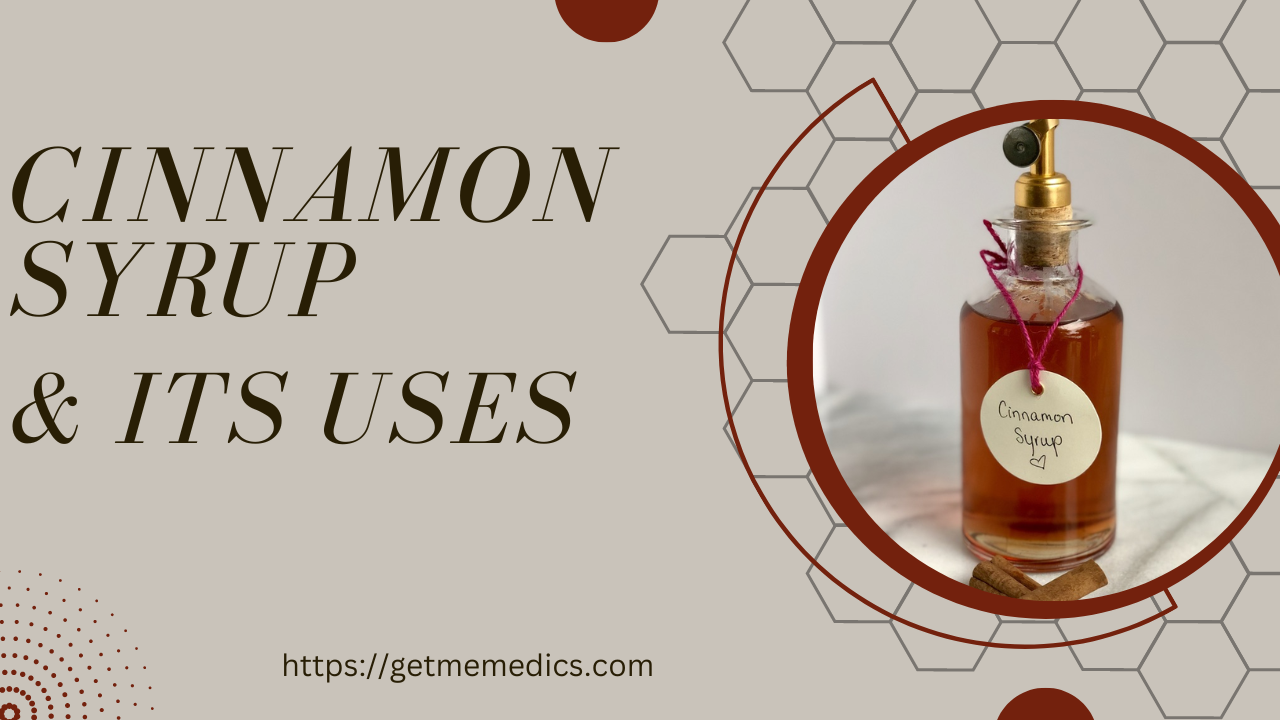Cinnamon, the warm and aromatic spice beloved across cultures, takes center stage in the form of Cinnamon Syrup. With its delightful sweetness and tantalizing spiciness, this syrup brings a burst of flavor and numerous health benefits to the table. In this detailed article, we will explore the captivating aspects of Cinnamon Syrup, including its uses, effects, precautions, interactions, safety considerations, dosage instructions, and more. Moreover, we’ll share an exquisite Cinnamon Syrup recipe to indulge your taste buds and enhance your well-being.
Cinnamon Syrup: A Sweet and Spicy Delight
Cinnamon Syrup is a luscious liquid extract derived from the inner bark of the Cinnamomum tree. Renowned for its rich aroma and natural sweetness, Cinnamon Syrup captures the essence of this beloved spice, making it an enticing addition to a variety of culinary and wellness endeavors.
Uses of Cinnamon Syrup
Cinnamon Syrup’s versatility makes it an excellent accompaniment to various aspects of life:
- Delectable Desserts: Drizzle Cinnamon Syrup over pancakes, waffles, ice creams, and pastries to elevate their flavors.
- Beverage Bliss: Enhance beverages like coffee, tea, hot chocolate, and smoothies with the warm and spicy notes of Cinnamon Syrup.
- Culinary Creations: Use Cinnamon Syrup as a flavorful addition to marinades, dressings, and sauces for an aromatic twist.
Effects of Cinnamon Syrup
The aromatic compound cinnamaldehyde in Cinnamon Syrup offers a range of health benefits:
- Antioxidant Powerhouse: Cinnamaldehyde’s antioxidants help combat oxidative stress, promoting overall cellular health.
- Blood Sugar Support: Cinnamon Syrup may help support healthy blood sugar levels, making it a potential aid for individuals with diabetes.
- Anti-Inflammatory Properties: Cinnamon’s anti-inflammatory properties may offer relief from certain inflammatory conditions.

Side Effects and Precautions
While Cinnamon Syrup is generally safe for most individuals when consumed in moderation, excessive intake may lead to digestive discomfort for some. Individuals with allergies to cinnamon or specific medical conditions should exercise caution and seek medical advice before using Cinnamon Syrup. Discontinue use and consult healthcare professionals if any adverse reactions occur.
Alternatives to Cinnamon Syrup
For those seeking alternatives or experiencing cinnamon allergies, several other delightful spice-infused syrups offer unique flavors and potential health benefits:
- Vanilla Syrup: Embrace the sweet and creamy essence of vanilla syrup, perfect for enhancing beverages and desserts.
- Cardamom Syrup: Indulge in the exotic and aromatic charm of cardamom syrup, ideal for adding a burst of flavor to various dishes.
- Nutmeg Syrup: Savor the warm and nutty taste of nutmeg syrup, an excellent addition to holiday-themed beverages and baked goods.
You may also look for:
- Cardamom syrup, its Uses, Composition, Side Effects and Precautions
- Turmeric Syrup, its Uses, Composition, Side Effects and Precautions
Interactions and Safety Considerations
As with any natural supplement, it is essential to consider potential interactions with medications or existing health conditions. Individuals on medications, pregnant, or breastfeeding should consult healthcare professionals before using Cinnamon Syrup. Proper storage in a cool, dry place ensures the syrup’s longevity and quality.
How to Take Cinnamon Syrup
Cinnamon Syrup offers versatility in its consumption:
- Sweet Elixirs: Mix Cinnamon Syrup into hot beverages, smoothies, and shakes to elevate their flavor profiles.
- Topping Delights: Drizzle Cinnamon Syrup over desserts, pancakes, and oatmeal for a sweet and spicy treat.
- Savory Twists: Incorporate Cinnamon Syrup into marinades and dressings for a unique and aromatic touch.
Dosage Instructions
The recommended dosage of Cinnamon Syrup may vary based on individual preferences and intended use. As a general guideline, 1-2 tablespoons daily for adults is a common suggestion. Dosages for children should be adjusted based on age and weight. However, personalized recommendations from healthcare professionals are essential, particularly for those with specific health conditions.
Warnings and Precautions
Cinnamon Syrup is a delightful and natural elixir, but some individuals may experience digestive discomfort with excessive consumption. Pregnant or breastfeeding women and individuals with cinnamon allergies should consult healthcare professionals before using Cinnamon Syrup. Discontinue use and seek medical attention if any adverse reactions occur.
Cinnamon Syrup Recipe
Ingredients:
- 1 cup water
- 1/2 cup granulated sugar
- 3-4 cinnamon sticks (about 3 inches each)
Instructions:
- In a saucepan, combine water and sugar, stirring until the sugar dissolves.
- Add the cinnamon sticks to the saucepan and bring the mixture to a gentle simmer over medium heat.
- Let the mixture simmer for about 10-15 minutes, allowing the cinnamon to infuse its warm and spicy flavor into the syrup.
- Remove the saucepan from heat and let the syrup cool slightly.
- Once cooled, remove the cinnamon sticks from the syrup using a slotted spoon or strainer.
- Transfer the Cinnamon Syrup to a clean, airtight container for storage.
- Store the syrup in the refrigerator for up to two weeks, ensuring its freshness and taste.
Conclusion
In conclusion, Cinnamon Syrup stands as a sweet and spicy delight that offers both culinary and wellness benefits. Its aromatic compound cinnamaldehyde provides antioxidant support, potentially aids in blood sugar regulation, and may assist in alleviating inflammation. However, like any natural supplement, moderation is key to enjoying its benefits.
FAQs
Q: Can Cinnamon Syrup be used as a substitute for traditional sugar syrups?
A: Yes, Cinnamon Syrup can be an excellent alternative to regular sugar syrups, offering unique flavors and potential health benefits.
Q: Is Cinnamon Syrup suitable for individuals with diabetes?
A: Cinnamon Syrup may potentially support healthy blood sugar levels; however, individuals with diabetes should consult healthcare professionals before use.
Q: Does Cinnamon Syrup have any other potential health benefits?
A: Cinnamon Syrup’s cinnamaldehyde may also have antimicrobial properties and support overall digestive health.
Q: Can I use ground cinnamon instead of cinnamon sticks for the recipe?
A: While cinnamon sticks are preferable for infusing the syrup, you can use ground cinnamon in a pinch, though it may be harder to strain out.
Q: Can Cinnamon Syrup be used in alcoholic beverages?
A: Absolutely! Cinnamon Syrup can be a flavorful addition to cocktails and mocktails, creating a delightful twist in your favorite drinks.
